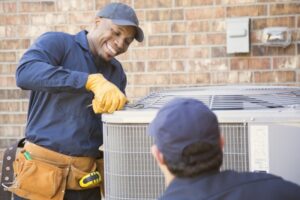 In our previous blog post, we addressed a question that many of our homeowners ask in late winter/early spring–is it too early for AC maintenance? If you read last month’s blog, then you already know that no, it’s not too early for this service. In fact, frequency matters here more than timing does!
In our previous blog post, we addressed a question that many of our homeowners ask in late winter/early spring–is it too early for AC maintenance? If you read last month’s blog, then you already know that no, it’s not too early for this service. In fact, frequency matters here more than timing does!
Early spring is generally the best time for AC maintenance because it’s before you actually need the system the most. But as long as you’re having your air conditioner tuned up at least once a year, you’ll be more likely to keep it in good shape. Of course, this means if you have a heat pump then you’ll need system tune-ups twice a year, since this is a year-round HVAC system.
But what actually happens during AC maintenance that makes it so important? This is one of the other common questions we get, and we are here now to answer it. Read on!
The Steps of Professional HVAC Maintenance
Every company will have different methods by which they provide AC maintenance. The best thing you can do is sign up for a maintenance plan that will ensure your air conditioner and heating system is always in good shape.
When it comes down to it though, there are some steps that stay the same across the board, no matter what professional is doing your maintenance. We’d go as far as to say that if any of these steps are skipped during the maintenance process, this isn’t a company you want to hire! DB Heating & Cooling goes through all the steps listed below, plus we provide member-exclusive benefits such as discounts on parts, labor, and diagnostic fees when you join our maintenance program!
Check the Electrical Components
It’s possible for an electrical problem with your air conditioner to go unnoticed for quite a while before it actually causes your air conditioner to show obvious symptoms. Electrical issues, for example, can cause an air conditioner to short-cycle, which is when it turns on and off rapidly, never actually completing a full cooling cycle.
You may still feel comfortable, but this is very inefficient for the system, and you’ll eventually notice your monthly energy bills spiking. Plus, it exacerbates wear and tear and can lead to premature system breakdowns.
Another electrical problem that might occur is a failing capacitor, which is a component that enables your system to start up and run.
Check the Thermostat
The thermostat is the “brain” of your air conditioner, sending it a signal for when it’s time to cycle on and off. If the thermostat is miscalibrated or has any other problems, then it can mess with the efficiency and efficacy of the unit.
Check Refrigerant Levels
Refrigerant is not a fuel. This means it doesn’t “run out” like gasoline does. If your system is losing refrigerant, it means there is a leak, which can be detrimental to the air conditioner. We check refrigerant levels and if they’re low, we recharge (refill) the system, and either fix the leak or alert you to the problem so you can schedule repairs.
Clears Condensate Drain
Your air conditioner produces moisture, and that moisture has to go somewhere. The condensate drain (and pan) is that somewhere. If it gets clogged up and the moisture has nowhere to go, it can damage your system and your property.
DB Heating & Cooling, Inc serves the heating and cooling needs of customers throughout Rockland County, NY as well as Bergen County, NJ and surrounding communities. You can count on us for expert services. Contact us today to schedule your next air conditioning maintenance session!
